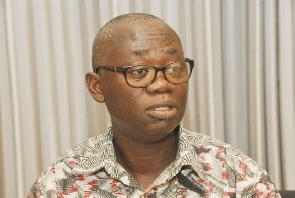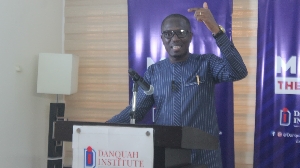General News of Friday, 2 October 2020
Source: kingdomfmonline.com
Licensure cancellation suicidal – GES Director-General cautions
The Director-General of the Ghana Education Service (GES), Prof. Kwasi Opoku-Amankwa, has said that it will be suicidal to reverse the professionalism of teachers by cancelling the teacher licensure examination.
“If that happens, then we will still keep our teachers below international standards. But we have to make every effort to bring them at par with their counterparts elsewhere, and that is the best practice everywhere,” he said in an interview.
Prof. Opoku-Amankwa was speaking with the media yesterday during a visit to the Accra College of Education, which serves as one of the centres for the Ghana Teacher Licensure Examination, which started yesterday.
Licensure exam
In all, 31,167 newly trained teachers are writing the two-day examination in Literacy, Essential Professional Skills and Numeracy.
The examination, which was slated for September 24 and 25, 2020, had to be rescheduled for October 1 and 2, 2020 because of the change of the academic calendar of the colleges of education as a result of the coronavirus disease (COVID-19) pandemic.
Quality of education
Prof. Opoku-Amankwa said if Ghana was really serious about quality of education, “then we should be very serious about the professionalism of teachers, of which licensing and continuous professional development are a part”, adding that the provision of the needed resources and other support for teachers was equally important.
“We cannot reverse the professionalism of teachers and continue to shout about quality of education,” he explained.
He explained that every professional body had a different way of assessing its members, saying that while for some it was purely practical, for others it was a mixture of practical and theory, while for others it was entirely theoretical.
Prof. Opoku-Amankwa maintained that the licensure examination would promote professionalism, adding that licensing was the norm for any group that called itself a profession, with a code of ethics to regulate the activities of its members.
He cited medical practitioners, lawyers, accountants, architects, nurses, among others, as professionals who licensed and regulated activities among themselves.
He indicated that elsewhere teachers were licensed, stressing that the best practice now was for teachers to have licences, citing countries such as the United Kingdom and South Africa.
He recalled that the decision to license teachers was announced by a former Director-General of the GES, Mr Jacob Kor, in 2016, “and so a lot of work has gone into it and we have come this far”.
He further said licensing the teaching profession would bring teachers at par with their counterparts elsewhere in the world and expressed the hope that it would inject quality teachers into the classrooms.
“We want to bring the quality of education up; the country needs a certain quality of teachers in the classrooms, and since teachers are key to education, we have to find a way of ensuring that only the best qualified are recruited through the licensure examination,” he emphasised.
Support
Prof. Opoku-Amankwa further explained that it was part of the government’s programme to maintain a standard, the reason it was to provide GHc1,200 for every teacher as professional development allowance as part of teachers’ upgrading and professionalisation.
He said beyond the periodic renewal of licences, teachers would be going through continuous professional development courses to ensure the quality was intact.
“We need to help them upgrade themselves. So this is part of the bigger picture that the government is engaging in to transform the educational sector to ensure that the ‘Teacher First Agenda’ that has been set is on course,” the DG of the GES, who is also the Supervisor-General of the licensure examination, stressed.
He said it was now mandatory that for one to be allowed into the classroom to teach, the person might have completed national service, which elicited patriotism, and also passed the licensure examination.
Flexibility
The Principal of the Accra College of Education, Dr Samuel Awinkene Atintono, expressed satisfaction with the selection of examination centres, saying that it was flexible, such that candidates were allowed to select centres closer to them.
He also talked about the advantage of the licence, explaining that it compelled teachers to continuously study because they would be required to go for renewal.
That, he said, would keep them on their toes and not to go to sleep after they had obtained the initial licence.













